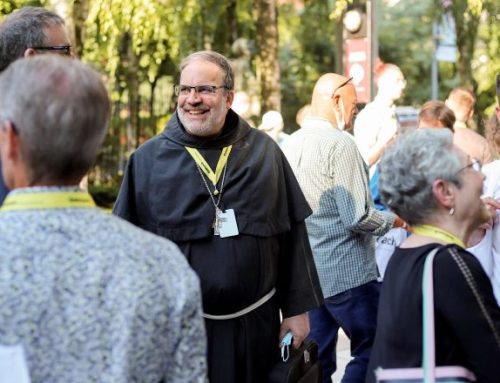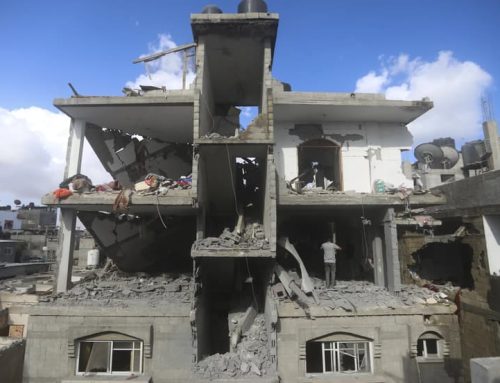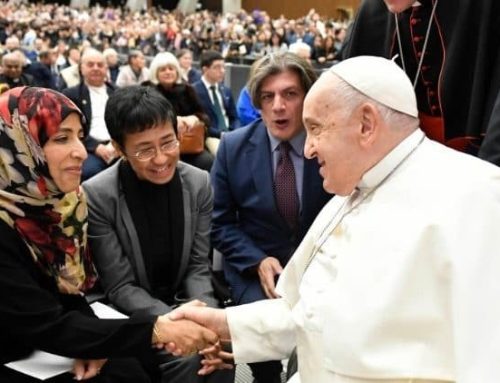His Beatitude Patriarch Michel Sabbah, Latin Catholic Patriarch emeritus of Jerusalem, and former President of Pax Christi International has issued the following statement today, on behalf of the Justice and Peace Commission, Jerusalem, dated May 16, 2022:
‘The Lord has an indictment against the inhabitants of the land. There is no faithfulness or loyalty, and no knowledge of God in the land. Swearing, lying, and murder, and stealing and adultery break out;
bloodshed follows bloodshed. Therefore, the land mourns, and all who live in it languish.’ (Hosea 4:1-3)
The killing of Palestinian journalist Shireen Abu Aqleh in Jenin on May 11, 2022 shocked us all. Gunned down, and she is not the last victim in the ongoing violence in the Holy Land. A daughter of our Christian community, she was well-known throughout the region as a news reporter for Al-Jazeera and thousands turned out to mourn her. The police brutality at her funeral has left us stunned. However, these past two months have seen much violence in the Holy Land most of it not reaching the headlines.
Bloodshed has followed bloodshed, claiming the lives of Israeli Jews, Palestinian Arabs and others too, all victims of a conflict that grinds on, taking its grim toll. We mourn all the victims of this unending bloodshed, Jewish Israelis, Palestinian Arabs and others who have died. We continue to cry out that violence is wrong and will not bring a solution but only more violence.
At the same time, we also express our anxiety about what the future holds. The political authorities who decide the future in Israel-Palestine as well as the most important segments of the international community seem unwilling to reflect in truth and with courage about what is happening in the Holy Land. Consequently, they cannot act to root out the causes of this violence. In our attempt here to understand the root of this violence, we in no way seek to justify it, however understanding is the only way to begin to find a way out of this deadly cycle.
1. What has happened recently?
In the past two months, 45 Palestinians, 16 Israelis and two migrant workers have been killed in what has been termed, ‘a new cycle of violence’. And the violence continues. This violence, although predominantly taking place in Palestine, still under Israeli occupation, has manifested inside Israeli territory too, where 15 Israelis who have died were killed in attacks carried out by Palestinians in retaliation for Israeli violence. Indeed, it is important to point out that this violence is part and parcel of the on-going conflict.
2. Why are people dying?
As long as the conflict between Israeli Jews and Palestinian Arabs continues, as long as there is no justice, no equality and no peace in the Holy Land, no sincere engagement to end the conflict, death will continue to be victorious. As long as a regime of military occupation continues to be imposed on those who live in East Jerusalem, the West Bank and the Gaza Strip, and as long as a regime of discrimination continues to be administered within the State of Israel, there will be no end to the cycle of violence. As long as local political leaders advance their own personal interests and ignore the cries of the widows, the orphans, the mothers and fathers in mourning, all who live in this land languish, as the Prophet Hosea says. As long as the international community shirks its responsibility for the situation in Israel/Palestine, the cogwheels of this seemingly unending conflict will continue turning.
3. What are the causes of the violence?
When Palestinians attack Israeli Jews, many advance interpretations of their motivations. They attribute the violence to Palestinian, Arab or Islamic ideologies that reject Israel, Israelis and even Jews. However, these acts of violence must be analyzed first and foremost within the context of the ongoing Israel-Palestine conflict.
It needs to be repeated with unequivocal clarity: the root cause and primary context of the violence is the occupation of Palestine, an occupation that has gone on for 55 years.
The violence of the occupation includes land expropriation, administrative detention, the withholding of building permits, house demolitions, the restriction of movement, the stifling of political, social and economic development and the ongoing siege of the Gaza Strip.
In particular, the tensions in the holy city of Jerusalem continue to aggravate the situation and escalate the levels of tension. These tensions include the constant threats to the status quo in the Haram al-Sharif (also known as the Temple Mount), the stifling restrictions on access to the Holy Places (for Christians this was again underlined this past Orthodox Saturday of Light, Holy Saturday), and the ongoing attempts to claim properties in occupied East Jerusalem, resulting in the eviction of people from their homes to be given to settlers, particularly in Sheikh Jarrah and Silwan.
The massive and violent reprisals by the Israeli security forces against the family, and sometimes against the whole neighborhood or town, of alleged Palestinian perpetrators of violence creates new resentment, hatred and desire for revenge and provide fertile soil for new attacks against Israeli Jews. Many of the perpetrators have relatives and friends who have fallen victim to the violence inherent in the occupation. Similarly, certain attempts by the Israeli forces to “prevent” new attacks, in fact exacerbate the conditions that are leading to acts of violence as bloodshed follows bloodshed.
It is glaringly outrageous that much of the violence of which Palestinians are victims originates from Israeli settlers and their vigilante groups, who have expropriated Palestinian lands and live illegally in the territories occupied by Israel. In some parts of the West Bank, settlers dominate entire areas, imposing a reign of lawlessness and terror on Palestinian families, neighborhoods and villages, preventing the inhabitants from travelling freely, working their lands, pasturing their flocks and living ordinary lives. Rather than defining their acts as crimes, or even in some cases as terrorism, the settlers are too often aided and abetted by the Israeli military. This is particularly true in the city of Hebron and its southern environs and the city of Nablus and its environs.
Furthermore, although not unprecedented, the fact that Palestinian citizens of Israel are carrying out attacks on Israeli Jews underlines the alienation that many Palestinian Arab citizens of Israel feel in a state in which they are citizens but which is defined as a “Jewish” state. These attacks are a sign of despair in the face of ongoing discrimination against Arabs in Israel itself and the regime of inequality. Furthermore, these acts are also a cry of rage against those attempting to erase the Palestinian identity of the Palestinian Arab citizens of Israel.
Unfortunately, as long as Palestinians resort only to verbal protest or non-violent actions (when the Israeli authorities authorise this), the international community ignores the Palestinians and gives the impression that everything is normal, promoting “normalisation” with the Israeli state despite the on-going conflict. Sadly, only when violence erupts, the international community wakes up and takes note.
4. A wider context of injustice
The so-called “Abraham Accords” that were formulated and triumphantly promoted by the US Trump administration certainly add to the sense of frustration and despair at the heart of the latest rounds of violence. Israel has now signed so-called “peace” accords with countries with which Israel has no conflict. These accords pursue common regional interests like opposition to Iran and economic and military collaboration. However, the accords blatantly ignore the real conflict in Israel/Palestine and the rights of the Palestinians. For the Palestinians, this adds insult to injury, reinforcing their feeling that, in the eyes of Israel and the powerful in the international community, they do not exist. Real peace can only be made between Israel and Palestine.
Another piece in the contemporary puzzle in order to understand the latest round of bloodshed is connected to the situation in Eastern Europe. As soon as Russia invaded the Ukraine, the international community, led by the United States, condemned the invasion and far-reaching sanctions were imposed by many countries including the United States, the European Union and the United Kingdom in order to pressure the Russian regime to withdraw from Ukrainian territory and cease its aggression. Many Palestinians compare these recent events with the decades of conflict in their own homeland. Israel has occupied Palestinian territory since 1967 and has imposed a discriminatory regime of inequality on Palestinians within Israel since 1948. However, those most vocal in condemning Russian aggression have done little to denounce Israeli occupation and discrimination. This double standard has only sharpened Palestinian frustration and despair.
Conclusion: Seeking peace and pursuing it
Two and a half millennia ago, the prophet Ezekiel called out against the princes of the land, “Put away violence and oppression, and do what is just and right. Cease your evictions of my people.” (Ezekiel 45:9).
Today we call on the authorities in Israel to seek out the reasons for the violence that engulfs us all. Responding to violence with violence, a logic of never-ending reprisal is not the answer. Israel and Palestine have the same rights: the rights to security, freedom, dignity and self-determination. Violence will not end until these rights are realized for both Israelis and Palestinians equally.
Israel is on a quest for “peace” where peace cannot be found. Israel seeks peace with the regimes of Arab countries but not with the people of the region. Real peace will only be realised when the Palestinians can affirm that their rights have been implemented. Peace will begin when the Palestinians proclaim that they are no longer at war with Israelis. Only then will a new chapter begin in the region.
It is the Psalmist who reminds us: “Which of you desires life, and covets many days to enjoy good? Keep your tongue from evil, and your lips from speaking deceit. Depart from evil, and do good; seek peace, and pursue it. The eyes of the Lord are on the righteous, and his ears are open to their cry” (Psalm 34:12-15).






